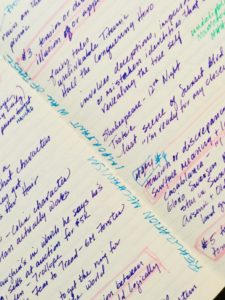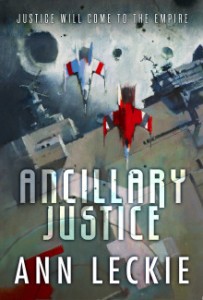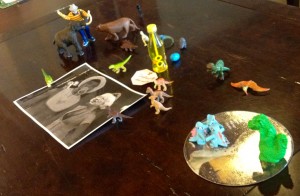
 A student wrote in to let me know they’d made it into Odyssey, huzzah, and asked if I had any advice about attending a workshop. As a matter of fact I do. Like many things in life, you get more out of a workshop if you’re willing to invest a little effort beforehand, during, and afterward.
A student wrote in to let me know they’d made it into Odyssey, huzzah, and asked if I had any advice about attending a workshop. As a matter of fact I do. Like many things in life, you get more out of a workshop if you’re willing to invest a little effort beforehand, during, and afterward.
I went through a number of workshops in college at both the undergraduate and graduate level, but the place where I learned the most was Clarion West, a six week workshop in Seattle. My instructors were Octavia Butler, Andy Duncan, L. Timmel Duchamp, Connie Willis, Gordon van Gelder, and Michael Swanwick; my classmates included Ann Leckie, E.C.Myers, Rashida Smith, and Rachel Swirsky, among others. If you read a lot of F&SF, you may recognize many of those names and realize how incredibly privileged I was to be part of that year.
How I Prepared
...
Neil Gaiman has been catching a lot of flack for this tweet.
People are, understandably, saying that the equation clarion + student = pro writer is not the only way you can reach that particular sum, and they are absolutely correct, although the drama is — as is often the case on the Internet — a bit hyperbolic.
This is the fact of F&SF (and any other genre) writing — there are writers disadvantaged by gender, or race, or sexuality or other physical circumstances. But there’s also a big group — which contains a disproportionate number of those differing physically — affected by economic issues.
Here are two simple facts:
But there is nothing being taught at a workshop that you cannot pick up by yourself, given time, though it is true that workshop teaching can often be inspirational, effective, and sometimes entirely life-changing.
Being able to attend a convention or workshop is not just a matter of being able to pay the substantial fee. It’s being able to travel and most importantly — it’s being able to take time away from both work and family. That’s an incredible privilege.
I came through Clarion West in 2005. My instructors were (in chronological order) Octavia Butler, Andy Duncan, L. Timmel DuChamp, Connie Willis, Gordon Van Gelder, and Michael Swanwick. I am a pretty convivial person, and remain close friends with the majority of my instructors. I also was part of a talented class that included E.C. Myers (winner of the Andre Norton Award for his book Fair Coin), Rachel Swirsky (frequent nominee and winner of things) and goddamn Ann Leckie, whose Ancillary series has set the bar for success so high the rest of us are just going, “Yeah right.”
I was able to do this because I had a partner willing to let me quit my job and try writing for a while. A decade later, I have yet to make half of what my Microsoft salary was through writing; I continue to persevere. If I had a family to support, it would have been incredibly difficult to do it — perhaps simply impossible. It gave me an advantage, and it also kicked me in the ass to be productive, because I was intensely aware of just how lucky I was.
Neil is — obviously — not saying you can’t be a writer without such a workshop. Note that Gaiman himself did not go to such a workshop, as far as I know. He is, though, enthused about the workshop (as befits a former instructor) and aware of what a big advantage it can prove.
But it also depends on what you make of it. In any class there will be those who persevere and those who fall by the wayside. Of the people in my writing workshop from decades ago at Hopkins, only a handful are still writing. Ten years later, a few members of my Clarion West class seem to have dropped off the face of the planet.
You have to want it hard enough to work for it, no matter what. You have to be willing to make time for writing words down and thinking about the order and what happens when you rearrange them. You have to have a hide hard enough to survive the day when there’s three rejections plus a nice fan letter whose writer is confused and thinks you’re someone else with a similar name. You have to be willing to trim away some bullshit activities and substitute stuff that lets you work at your craft, like reading or taking online classes or whatever. That’s the part you need.
A while back, I read someone saying that we all have someone who gives us permission to call ourselves a writer. For me, it was John Barth: sitting in his sunlit Hopkins office, a bookcase framing his smiling, balding head talking about my stories and a fellowship he wanted me to apply for is something I will always remember. But that is less important than giving yourself permission to call yourself a writer. It’s harder — it requires a certain amount of adamant ego and determination — but that permission can — and must — come from inside as well as externally. That’s the most important component, and you can do it with or without the aid of a workshop.
TL;DR version? Ain’t nothing going to substitute for hard work. Why aren’t you writing?
Later addendum: Most of the workshops do offer some scholarships; if there’s one you’re interested in, I do suggest asking about what financial aid is available.
...

But for writers, I think it’s very important to go outside it on a regular basis. For one thing, your characters are going to be outside their comfort zones, being challenged, tested, thwarted, more often than not, because one thing about comfort zones is that they can be pretty darn boring to read about. Who wants a character for which everything goes right? (This is, I will argue, why the Richie Rich comic books were pretty darn bland.) How can you write a character outside their comfort zone if you don’t know what it’s like?
And outside our comfort zone is where we learn new things, new skills, new things about ourselves. Here in Costa Rica, my Spanish skill is leaping upward in a way it wouldn’t at home, despite all my best resolutions about daily Duolingo workouts or buying books in Spanish from Amazon. And that in turn has prodded me to try some new things with it, like using one of my stories as a practice piece in translation.
This is why, when I talk to students about going into a workshop like Clarion West or Viable Paradise, I urge them to try to fail. Because you learn so much more from a story where you tried something new and failed than one where you did the same thing you always did. I wrote Zeppelin Follies while at Clarion West as my very first try at a screwball comedy, and I will confess that the first draft was a horrible mishmash of stuff. And boy did I learn a lot from that.
Fortunately, for the vast majority of writers, we like new things. New words, new vistas, new thoughts. And we find them outside that comfort zone, in a place that is frightening and exhilarating all at once. Whizzing along a zipline, diving into waters over our head, talking to strangers. If you doubt that you are brave enough to do such things, remember that you do something braver everyday by putting your writing out there for other people to look at.
Enjoy this writing advice and want more content like it? Check out the classes Cat gives via the Rambo Academy for Wayward Writers, which offers both on-demand and live online writing classes for fantasy and science fiction writers from Cat and other authors, including Ann Leckie, Seanan McGuire, Fran Wilde and other talents! All classes include three free slots.
Prefer to opt for weekly interaction, advice, opportunities to ask questions, and access to the Chez Rambo Discord community and critique group? Check out Cat’s Patreon. Or sample her writing here.
...

What: Ancillary Justice by Ann Leckie is a fabulous space opera with an unusual protagonist whose struggle will pull the reader in. It is, alas, not a particularly long book, and I could have read at least twice more the length happily.
Who: read this if you like space opera or action-filled but character driven SF. Read it if you want to hear the latest in the ongoing conversation about gendered pronouns held between SF writers for decades now. Read it for the sake of enjoyment and rejoice to know it’s the first of three.

Why: Read this because it will be appearing on many of the awards ballots this year and rightly so. Read it so you know why you’re voting for it. Read it because it does new and interesting things. Read it because it’s good.
Where/how: This is ideal for a while-away-some-hours situation, depending on your reading speed. Leckie’s world is immersive, intelligent, and interesting.
...
 It’s the last week of the Clarion West Write-a-thon! Donate now and you’ll get the donors reward, a file in the format of your choice containing all the writing I’ve done over the course of the Write-a-thon plus a couple of bonuses.
It’s the last week of the Clarion West Write-a-thon! Donate now and you’ll get the donors reward, a file in the format of your choice containing all the writing I’ve done over the course of the Write-a-thon plus a couple of bonuses.
Donate as little as a dollar and get (the package so far):
Even if you don’t want to sponsor me, check out some of the other fine writers participating in the Writeathon!
...
 Yesterday I spent a pleasant chunk of time talking to the Clarion West 2013 students, along with Django Wexler. Django and I were the “mystery muses,” a Friday feature for the CW students where people come in to chat about a specific aspect of the writerly life. Django spoke well to the experience of having one’s first major book come out, since his book (which I have read and heartily recommend) The Thousand Names just came out. He let us all know (to mass disappointment) that it doesn’t lead to being booked on the Leno or Daily Show or lavish book tours, though he did get to go to ComicCon.
Yesterday I spent a pleasant chunk of time talking to the Clarion West 2013 students, along with Django Wexler. Django and I were the “mystery muses,” a Friday feature for the CW students where people come in to chat about a specific aspect of the writerly life. Django spoke well to the experience of having one’s first major book come out, since his book (which I have read and heartily recommend) The Thousand Names just came out. He let us all know (to mass disappointment) that it doesn’t lead to being booked on the Leno or Daily Show or lavish book tours, though he did get to go to ComicCon.
I decided to talk about self-promotion and career building, since that’s advice I didn’t get a lot of while at Clarion West myself. And I came up with nine maxims, but lost that index card so I have an incomplete list. Maybe the students can chime in to tell me what I’ve forgotten.
Some other things that got mentioned:
And here’s something I didn’t mention, but which has come up a lot recently, as to what to blog about, both in terms of finding something interesting and not spending too much time on it: excerpts of what you’re working on both fulfills those terms and encourages you to get some words out.
Enjoy this advice for writers and want more content like it? Check out the classes Cat gives via the Rambo Academy for Wayward Writers, which offers both on-demand and live online writing classes for fantasy and science fiction writers from Cat and other authors, including Ann Leckie, Seanan McGuire, Fran Wilde and other talents! All classes include three free slots.
Prefer to opt for weekly interaction, advice, opportunities to ask questions, and access to the Chez Rambo Discord community and critique group? Check out Cat’s Patreon. Or sample her writing here.
...
 (This is from the yet untitled steampunk-new weird-horror piece which I’m thinking will be the first week’s Writeathon story and which I also think may end up at novelette length.)
(This is from the yet untitled steampunk-new weird-horror piece which I’m thinking will be the first week’s Writeathon story and which I also think may end up at novelette length.)
Doctor Larch has a pet crow named Jonah. He says he raised it from a chick, but I have trouble imagining Doctor Larch patiently nursing anything, feeding it mealworms or bits of meat or making sure it was warm or sheltered. If he has such a faculty for tenderness, he doesn’t exhibit it towards any of the patients.
Today he made an appearance to supervise Mr. Abernathy’s removal from his chair.
They should have realized Abernathy was never moving from it, but the orderlies probably welcomed not having to lift him back and forth. They left him in there till his flesh grew into the wicker, and today he screamed while they cut it away and Doctor Larch watched. He wears a pad on his shoulder for the crow to shit on, but it misses a great deal of the time, and the Doctor’s black coat is clotted with gray and white on its backside.
It’s hit or miss whether or not Abernathy will survive. I don’t know that he cares, either way. Before this, all he did was stare out his window, day and night, looking eastward, towards the mountains the white men call the Cascades.
There was thunder last night. Not natural thunder, but echoes from the battle being waged far out to sea and among the San Juan Islands. We’re close enough to those battlelines that many people have fled Seattle. Others have stuck it out, saying that the lines will shift again, in a different direction.
I have stayed. But where else would I go?
Enjoy this sample of Cat’s writing and want more of it on a weekly basis, along with insights into process, recipes, photos of Taco Cat, chances to ask Cat (or Taco) questions, discounts on and news of new classes, and more? Support her on Patreon.
...

A lot of people are driving pledges with backer incentives. Here’s mine:
I plan to complete one story each week. At the end of the six weeks, all backers will receive copies of the stories written during the Write-a-thon along with a bonus story.
So I just wanted to point out – you get to pick the donation amount. In return, you’re getting at least seven Cat Rambo short stories, which, although they’ll be a bit drafty, I’d like to think is a pretty good value. 😉
You can sign up as a backer by clicking the Donate button on this page.
...

Here’s the afternote for the story:
This story was written for Clarion West, during the week that L. Timmel DuChamp was our instructor, and is my attempt at a screwball comedy, combined with the idea of the Bodys, which was inspired by a long walk in which my foot began to hurt, making me think about what it would be like to be able to switch body parts easily.
The story appeared in the final issue of Crossed Genres, a magazine which I was pleased to support during its existence and which went away far too quickly (although at the time I’m writing this, a Kickstarter projector looks as though it may succeed in reviving the magazine.) “Long Enough and Just So Long,” which appears in the Near volume of this collection, was originally written for a contest of theirs, but got purchased before I could send it to them.
“Zeppelin Follies” remains a story I’m fond of, particularly since I can remember the three am, story-due-tomorrow moment that led to the line, “Look, is that a zeppelin?”
...

But words are imprecise things, and so I’m a-gonna do what we used to call “unpacking” back in grad school and even provide some useful examples.
What did Connie say? She said, “Good fiction teaches us what it means to be human.” As good f&sf writers, I would argue that we might change “human” to “self-aware being,” but that is picking nits.
So what does that mean? It means we’re all faced with this common problem: life. And we want to know what we’re supposed to do, and what we can get away with, and what to do about all that hardcoded primate behavior that keeps popping up from time to time, and stuff like that. Sometimes the message features a universal human, sometimes it is a human shaped by particular circumstances, such as race, gender, class, sexuality, disability, etc. It’s why we like to read fiction. It’s why we like gossip. We want to know what other human beings do.
And here’s why this is important: Sometimes thinking about what a story is trying to say is a good way to complete, rewrite, or sharpen it. Doing this at one of those stages can move a story from good to excellent. Do I start a story knowing the message? Hell no. It emerges (hopefully). Sometimes I have to coax it out of its hiding place in the prose. Sometimes I have to go in with a club.
...
Want access to a lively community of writers and readers, free writing classes, co-working sessions, special speakers, weekly writing games, random pictures and MORE for as little as $2? Check out Cat’s Patreon campaign.

"(On the writing F&SF workshop) Wanted to crow and say thanks: the first story I wrote after taking your class was my very first sale. Coincidence? nah….thanks so much."

(fantasy, short story) At the time he did it, the wizard Moulder found the idea of removing his heart, applying a calcifying solution, and storing it in a safe place, all in the name of achieving immortality, quite reasonable.


This site is protected by reCAPTCHA and the Google Privacy Policy and Terms of Service apply. This site is a participant in the Amazon Services LLC Associates Program, an affiliate advertising program designed to provide a means for sites to earn advertising fees by advertising and linking to Amazon.com.